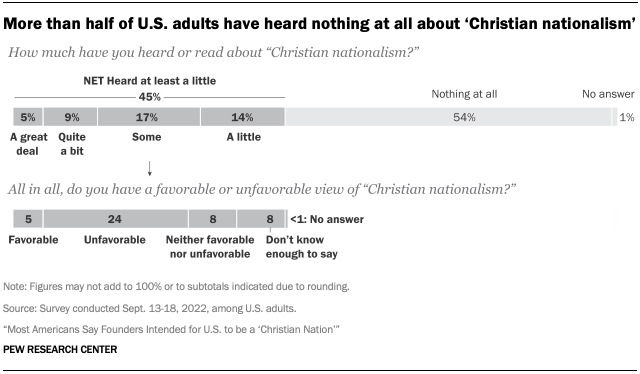
In their own words: How Americans describe ‘Christian nationalism’
Public attention to the concept of “Christian nationalism” has grown rapidly in the past few years. Google Trends data shows a significant rise in searches for the term following the Jan. 6 riot at the U.S. Capitol, and searches for the term peaked in July 2022 after Rep. Marjorie Taylor Greene, R-Ga., declared in an interview that “We need to be the party of nationalism and I’m a Christian, and I say it proudly, we should be Christian nationalists.” Several other religious and political leaders also recently have embraced the “Christian nationalist” label.
Despite this growing attention, less is known about how the U.S. public views Christian nationalism. A new Pew Research Center survey finds that more than half of all U.S. adults (54%) have not heard or read anything about Christian nationalism. An additional 16% of Americans have heard at least “a little” about Christian nationalism but say they have neither a favorable nor unfavorable view of it, or that they don’t know enough to take a position. And about one-quarter of all Americans (24%) express an unfavorable view of Christian nationalism, while 5% view it favorably.

The survey asked 2,540 respondents who have heard at least “a little” about Christian nationalism: “In your own words, what does the phrase ‘Christian nationalism’ mean to you?” Many describe “Christian nationalism” in terms of Christian dominance in society, while others associate the concept with racism, authoritarianism, bigotry and exclusion. A smaller portion of Americans describe it as the positive influence of faith and morals in society. The following selection of responses captures the range of different views expressed.